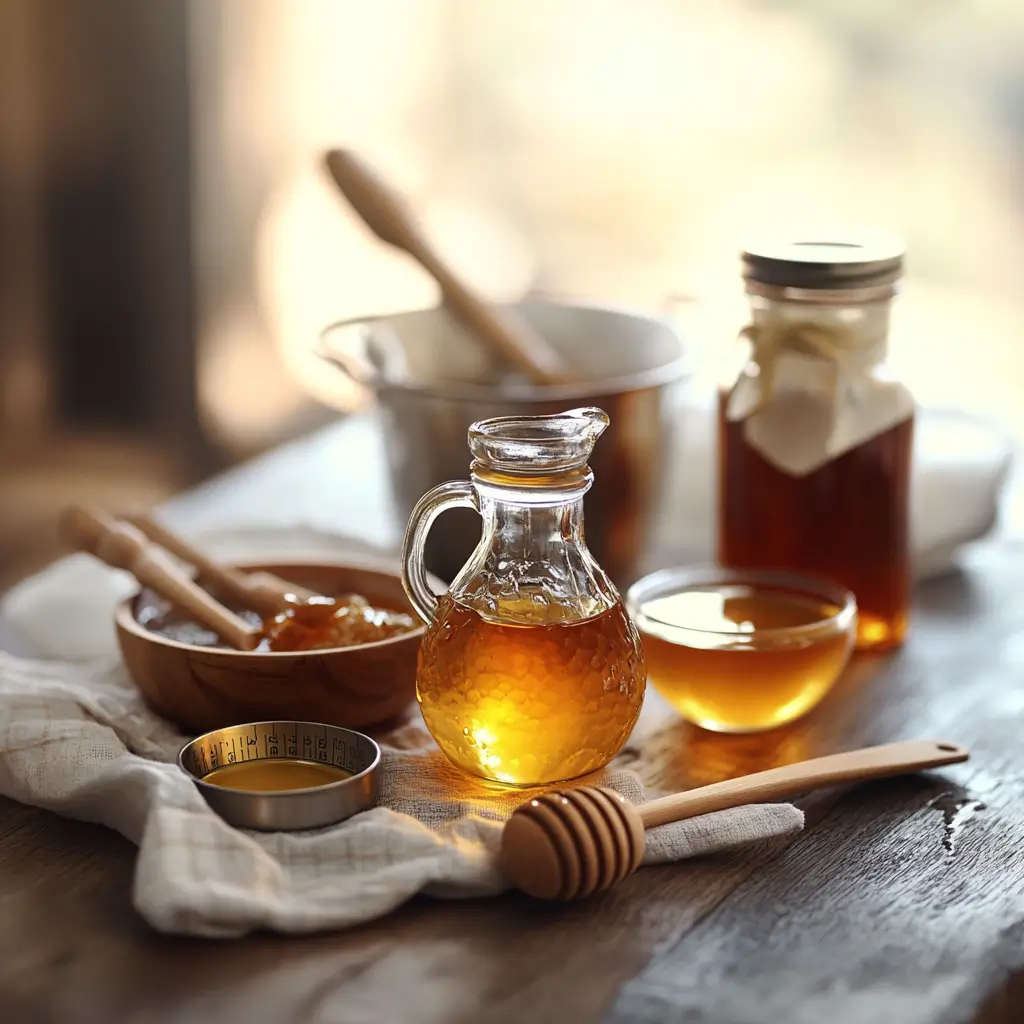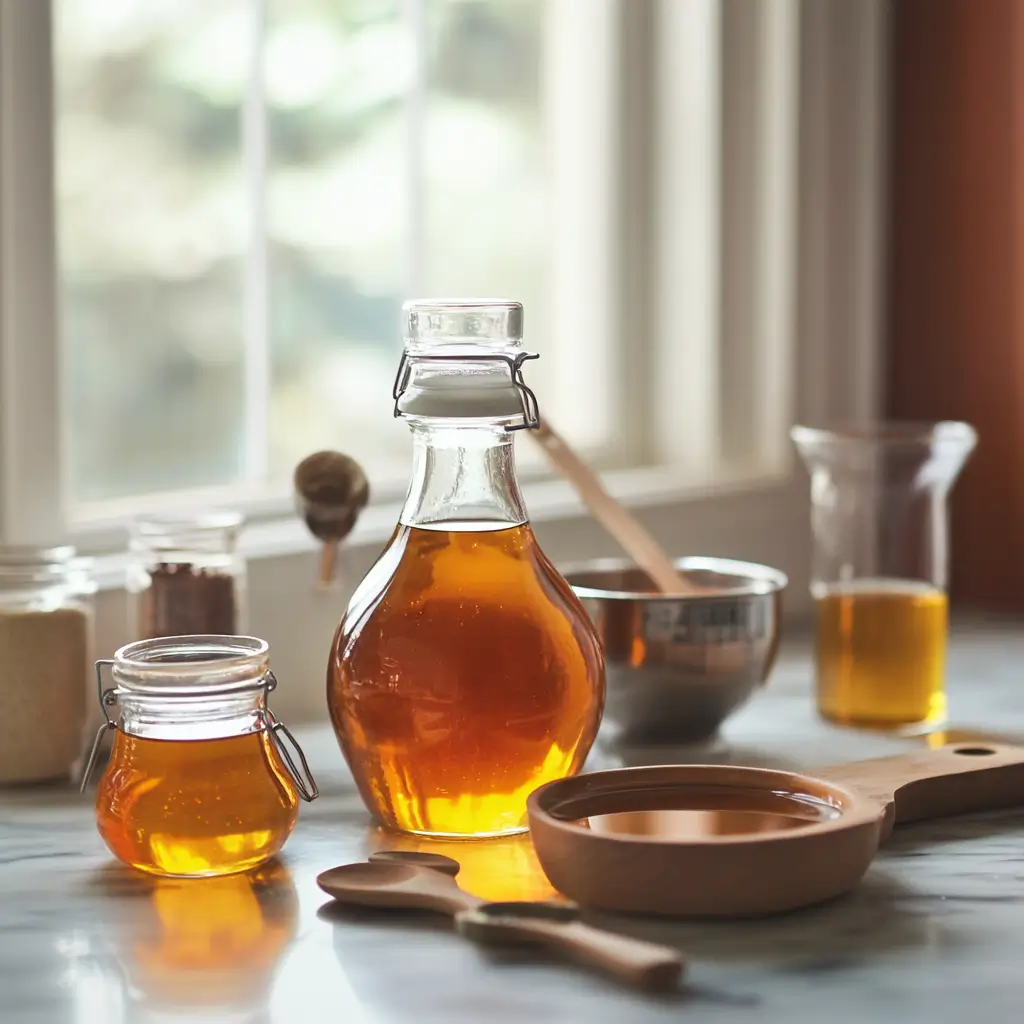Golden syrup is one of the most popular corn syrup alternatives, offering a caramel-like sweetness with a rich, buttery flavor. Because of its texture and taste, it works exceptionally well as a homemade substitute for corn syrup, particularly in baking and candy-making.
Table of Contents
What is Corn Syrup and Why Do Manufacturers Use It?
Manufacturers create corn syrup by breaking down cornstarch into glucose. This liquid sweetener enhances sweetness, retains moisture, and improves texture in processed foods. It plays a crucial role in baking and candy making by preventing crystallization and creating a smooth, glossy finish. Its affordability and versatility have made it a staple in the food industry.
Common Reasons People Avoid Corn Syrup
Many individuals choose to avoid corn syrup for several reasons:
- Health Concerns: Studies link high consumption, especially of high-fructose corn syrup (HFCS), to obesity, diabetes, and other metabolic disorders.
- Dietary Restrictions: Those who follow organic, non-GMO, or plant-based diets often avoid products made with genetically modified corn.
- Preference for Natural Alternatives: Some consumers favor less processed sweeteners that offer additional nutrients or a more appealing flavor profile.
Natural Sweeteners as Substitutes
Replacing corn syrup with natural alternatives can provide similar sweetness and consistency while offering additional health benefits and unique flavors. Here are some popular choices:
Honey: A Versatile and Natural Option
Bees create honey from flower nectar, making it a widely used natural sweetener. Honey offers antioxidants and antibacterial properties and serves as a great substitute for corn syrup in recipes. Its viscosity makes it ideal for glazing, baking, or sweetening beverages.
- Advantages: Honey contains trace nutrients, offers a distinct flavor, and undergoes minimal processing.
- Uses: This sweetener works well in marinades, salad dressings, and baked goods.
Maple Syrup: Rich Flavor for Cooking and Baking
Maple syrup, derived from the sap of sugar maple trees, is another natural alternative. Its unique, rich flavor makes it a popular choice for pancakes, waffles, and desserts. Maple syrup contains small amounts of minerals like manganese and zinc.
- Advantages: Adds depth to recipes, has a robust flavor, and is vegan-friendly.
- Uses: Perfect for baking, sauces, and drizzling over breakfast dishes.
Agave Nectar: A Sweeter, Lower-Glycemic Option
Agave nectar is a sweetener derived from the agave plant, offering a neutral flavor and a low glycemic index compared to other sweeteners. It is much sweeter than sugar or corn syrup, so smaller amounts are needed.
- Advantages: Suitable for diabetics (in moderation), dissolves easily in cold liquids, and has a mild taste.
- Uses: Ideal for beverages, dressings, and no-bake recipes.
Plant-Based Syrup Alternatives
Plant-based syrup alternatives are gaining popularity among those looking for natural, vegan-friendly substitutes for corn syrup. These options offer unique flavors, nutrient profiles, and various culinary applications, making them excellent choices for different recipes.

Brown Rice Syrup: Mild and Nutty Flavor
Brown rice syrup is made by breaking down the starch in brown rice into simple sugars, resulting in a thick, amber-colored syrup with a mild sweetness and nutty undertone. It is less sweet than corn syrup but works well in recipes that require a subtle flavor and a sticky consistency.
- Advantages: Vegan-friendly, minimally processed, and has a low glycemic index compared to other sweeteners.
- Uses: Ideal for granola bars, energy bites, and as a binder in baking recipes.
Barley Malt Syrup: For a Distinct Malt Taste
Barley malt syrup is a dark, viscous sweetener made from sprouted barley grains. It has a rich, malty flavor that pairs well with hearty baked goods and savory recipes. Although less sweet than corn syrup, its distinct taste can enhance the complexity of a dish.
- Advantages: Natural and vegan, provides a deep flavor profile, and is a source of trace minerals.
- Uses: Commonly used in breadmaking, bagels, and as a flavor enhancer in sauces and marinades.
Fruit-Based Substitutes
Fruit-based syrups are natural alternatives derived from whole fruits, offering both sweetness and additional nutrients. They are versatile and can be used in a wide range of recipes.
Date Syrup: A Sweet and Nutrient-Rich Option
Date syrup is made from pureed dates and water, resulting in a thick, caramel-colored syrup with a rich sweetness. It retains many of the nutrients found in dates, including fiber, potassium, and antioxidants.
- Advantages: Naturally sweet, nutrient-dense, and free of added sugars or preservatives.
- Uses: Great for drizzling over oatmeal, pancakes, or yogurt, as well as for sweetening baked goods and smoothies.
Apple or Pear Syrup: Light and Fruity Alternatives
Apple and pear syrups are made by reducing the juices of these fruits into a concentrated, sweet syrup. They have a light, fruity flavor that complements both sweet and savory dishes.
- Advantages: Naturally sweet, contains vitamins and minerals from fruit, and is a good choice for those seeking a mild taste.
- Uses: Suitable for glazing roasted vegetables, adding to salad dressings, or as a topping for desserts and breakfast dishes.
Specialty Sweeteners as Corn Syrup Substitutes
Specialty sweeteners offer unique flavors and benefits, making them excellent corn syrup substitutes for those looking for healthier or more diverse options.
Stevia Syrups: A Sugar-Free Corn Syrup Substitute
Stevia syrups are a popular sugar-free choice among corn syrup alternatives, especially for individuals following low-calorie or diabetic-friendly diets.
How to Make Homemade Simple Syrup
Simple syrup is a versatile sweetener made by dissolving sugar in water. It has a neutral flavor, making it adaptable to various recipes. Additionally, you can easily adjust its consistency to suit your needs.
- Ingredients: 1 cup of sugar (white or brown) and 1 cup of water.
- Instructions:
- First, combine the sugar and water in a saucepan.
- Next, heat the mixture over medium heat, stirring continuously until the sugar dissolves completely.
- Afterward, let the syrup cool and transfer it to an airtight container.
- Finally, store the container in the refrigerator for later use.
- Uses: This simple syrup is perfect for cocktails, coffee, and tea. Furthermore, it serves as an excellent base for glazes, making it a kitchen staple for various recipes.
DIY Golden Syrup: A Reliable Substitute for Corn Syrup
Golden syrup is one of the best corn syrup alternatives, offering a caramel-like sweetness with a rich, buttery flavor. Because of its texture and taste, it works exceptionally well as a homemade substitute for corn syrup, particularly in baking and candy-making.
- Ingredients: 1 cup sugar, ¼ cup water, and 2 tbsp lemon juice.
- Instructions:
- First, heat the sugar, water, and lemon juice in a saucepan over medium heat.
- Then, stir until the sugar dissolves completely.
- After that, reduce the heat and simmer the mixture for 10–15 minutes until it thickens and turns a golden color.
- Finally, allow the syrup to cool before using it in recipes.
- Uses: Golden syrup is ideal for making treacle tarts, puddings, or replacing corn syrup in baking recipes. Additionally, its rich flavor enhances the taste of various desserts, making it a versatile addition to your pantry and a valuable option among corn syrup alternatives.
Specialty Sweeteners
Specialty sweeteners offer unique flavors and benefits, making them excellent corn syrup alternatives for those seeking something different from traditional syrups.
Stevia Syrups: A Sugar-Free Option
Stevia syrups, derived from the extract of the stevia plant, are a popular choice among corn syrup alternatives for individuals following sugar-free or low-calorie diets. These syrups provide intense sweetness without raising blood sugar levels, making them particularly appealing to those with dietary restrictions.
- Advantages: Zero-calorie, diabetic-friendly, and suitable for keto and low-carb diets.
- Uses: Best for sweetening beverages, yogurt, or as a drizzle over fruits and desserts. For more tips on maintaining a keto-friendly diet, check out Keto Crock Pot Recipes: Tips and Mistakes to Avoid.
Sorghum Syrup: A Unique Sweetener for Traditional Recipes
Sorghum syrup, derived from the juice of the sorghum plant, is a staple in Southern cooking. It has a distinct, earthy sweetness and is rich in iron, calcium, and potassium, making it a nutrient-dense alternative to corn syrup.
- Advantages: A natural, nutrient-rich sweetener with a robust flavor.
- Uses: Commonly used in biscuits, cornbread, marinades, and as a topping for pancakes and waffles. To explore its role in holiday desserts, visit Substitutes for Corn Syrup in Pecan Pie.
DIY Corn Syrup Alternatives
For those who prefer homemade solutions, simple syrup and golden syrup are excellent options. These can be tailored to your specific taste and recipe needs.
- DIY Recipes: Learn how to make these easy alternatives in our guide to What Can I Use Instead of Corn Syrup?.
Cultural and Regional Sweeteners
In many cultures and regions, traditional sweeteners have long been used as alternatives to processed syrups. These sweeteners not only add flavor but also carry cultural significance and are often more natural and nutrient-rich than refined options.
Jaggery Syrup: A Popular Substitute in South Asia
Jaggery syrup is made by dissolving jaggery, a traditional unrefined sugar, in water or reducing its liquid form. It has a deep, caramel-like sweetness with earthy undertones.
- Advantages: Rich in minerals like iron, magnesium, and potassium; minimally processed.
- Uses: Commonly used in South Asian desserts, beverages like chai, and savory dishes such as curries and chutneys.
Coconut Syrup: Widely Used in Tropical Regions
Coconut syrup, derived from the sap of coconut trees, is a popular sweetener in tropical regions like Southeast Asia and the Pacific Islands. It has a mild, nutty sweetness and is rich in nutrients.
- Advantages: Low glycemic index, vegan-friendly, and contains trace minerals.
- Uses: Perfect for drizzling over pancakes, sweetening beverages, or adding to baked goods.
Choosing the Right Substitute
When selecting a sweetener substitute, it’s essential to consider the flavor, texture, and dietary requirements to ensure the best match for your dish.
Matching the Flavor Profile of Your Dish
Each sweetener has its own unique taste, which can significantly affect the outcome of your recipe:
- For Neutral Sweetness: Simple syrup or brown rice syrup work well.
- For Caramel Notes: Golden syrup, jaggery syrup, or date syrup add depth and complexity.
- For Fruity Flavors: Apple or pear syrups provide light, tangy sweetness.
- For Nutty or Rich Flavors: Coconut syrup or barley malt syrup are excellent choices.
Accounting for Dietary Preferences and Restrictions
Different dietary needs can influence the choice of sweetener:
- For Low Glycemic Index: Agave nectar, stevia syrup, or coconut syrup are ideal.
- For Vegan Diets: Avoid honey and opt for plant-based options like agave, coconut, or fruit-based syrups.
- For Nutrient-Dense Options: Choose date syrup, jaggery syrup, or sorghum syrup.
FAQs on Corn Syrup Substitutes
1. Are these substitutes suitable for candy making?
Yes, many substitutes work well in candy making, but it depends on the recipe:
- Golden Syrup and Brown Rice Syrup: Excellent for candy due to their similar viscosity and ability to prevent crystallization.
- Honey and Maple Syrup: Can work but may alter the flavor slightly.
- Agave Nectar: Not ideal for hard candies as it lacks the stability of corn syrup under high heat.
2. Which substitutes are the healthiest options?
The healthiest options are typically less processed and offer added nutrients:
- Date Syrup: Rich in fiber, antioxidants, and minerals.
- Honey: Contains antioxidants and antimicrobial properties.
- Coconut Syrup: Low glycemic index and nutrient-dense.
- Stevia Syrups: Zero-calorie and sugar-free, ideal for those managing blood sugar levels.
3. Can I use these alternatives in savory dishes?
Absolutely! Many sweeteners complement savory recipes:
- Jaggery Syrup and Date Syrup: Enhance the flavors of curries, marinades, and barbecue sauces.
- Coconut Syrup: Works well in Asian dishes and dressings.
- Maple Syrup: Perfect for glazes on meats and vegetables.
4. Do these substitutes work in baking?
Yes, most substitutes can work effectively in baking. However, their suitability largely depends on the specific recipe and desired outcome. For instance:
- Brown Rice Syrup and Golden Syrup: These substitutes are the closest to corn syrup in terms of texture and consistency, which makes them ideal for most baked goods. Additionally, they help maintain the structure and moisture of the final product, ensuring a desirable texture throughout the baking process.
- Honey and Agave Nectar: While these sweeteners add moisture to recipes, they may also cause browning due to their sugar content. Therefore, it’s essential to adjust baking times accordingly to prevent overbaking or burning. Furthermore, their distinct flavors may slightly alter the taste of the final dish, which can be either a benefit or a limitation depending on the recipe.
- Maple Syrup and Fruit-Based Syrups: These options are particularly suited for recipes where distinct flavors enhance the dish, such as muffins or sweet bread. Consequently, they may not work as well in recipes requiring a neutral-tasting sweetener. However, they can add a delightful depth of flavor to compatible dishes, making them a unique choice for flavor-forward recipes.

5. What is the closest alternative in taste and texture?
When searching for a substitute that closely mimics corn syrup in both taste and texture, two options stand out:
- Golden Syrup: This alternative is the most similar, offering a flavor profile and consistency almost identical to corn syrup. As a result, it can seamlessly replace corn syrup in many recipes without requiring major adjustments. Furthermore, its ability to mimic the glossy finish of corn syrup makes it a favorite among bakers.
- Brown Rice Syrup: Although it provides a comparably sticky texture, it is slightly less sweet. Consequently, you may need to adjust the sweetness level in your recipe to achieve the desired balance. Moreover, its mild flavor works well in both sweet and savory applications, which adds to its versatility and makes it a valuable addition to any kitchen.
6. Are homemade syrups cost-effective compared to store-bought ones?
Yes, making syrups at home often proves to be more cost-effective, and there are several reasons why:
- Simple Syrup and Golden Syrup: You can easily prepare these syrups with basic pantry ingredients like sugar and water, which ensures affordability and accessibility. Additionally, the process is quick and requires minimal effort, making it a convenient option for home cooks.
- Customizable Recipes: By making syrups at home, you gain complete control over the amount and flavor, reducing waste while ensuring optimal freshness. Furthermore, this flexibility allows you to tailor the syrup to meet specific recipe requirements or personal taste preferences, which is not always possible with store-bought options.
- Savings: Moreover, creating your own syrups helps you avoid the premium prices associated with specialty sweeteners such as coconut or date syrups. Over time, the savings can add up significantly, especially if you frequently use syrups in your cooking and baking. Additionally, homemade syrups eliminate the need for unnecessary additives or preservatives, making them a healthier and more economical choice.
Conclusion
Corn syrup substitutes are incredibly versatile, making them suitable for a wide range of uses, from candy-making to savory dishes. Furthermore, the best choice depends on your recipe, dietary preferences, and whether you prioritize affordability or health-conscious options. Ultimately, with so many alternatives readily available today, finding the right fit for your culinary needs has never been easier. Additionally, exploring these substitutes can introduce new flavors and textures to your dishes, elevating your cooking and baking to exciting new levels. Lastly, incorporating these alternatives into your kitchen repertoire can help you achieve delicious results while aligning with your health and lifestyle goals.

